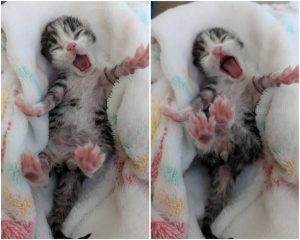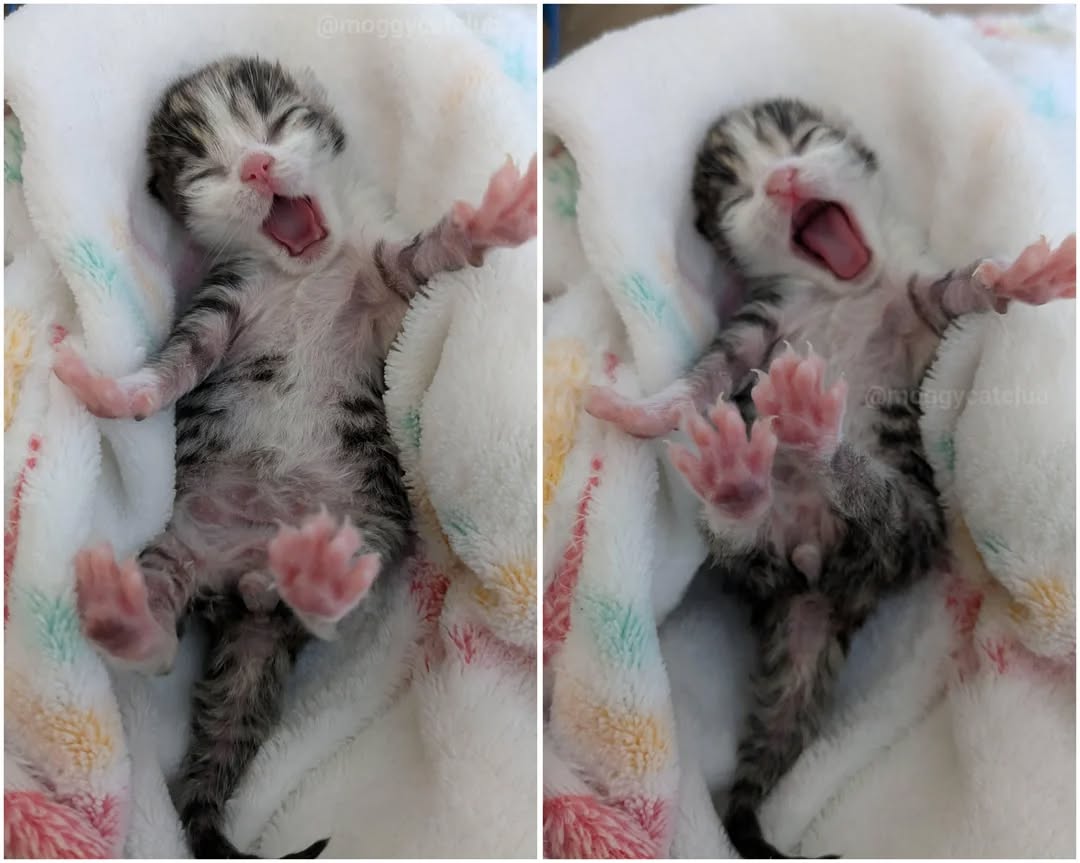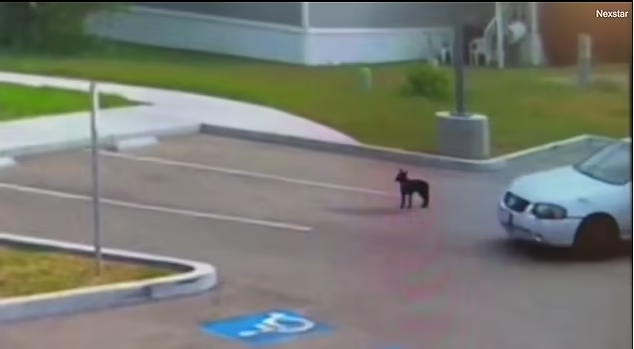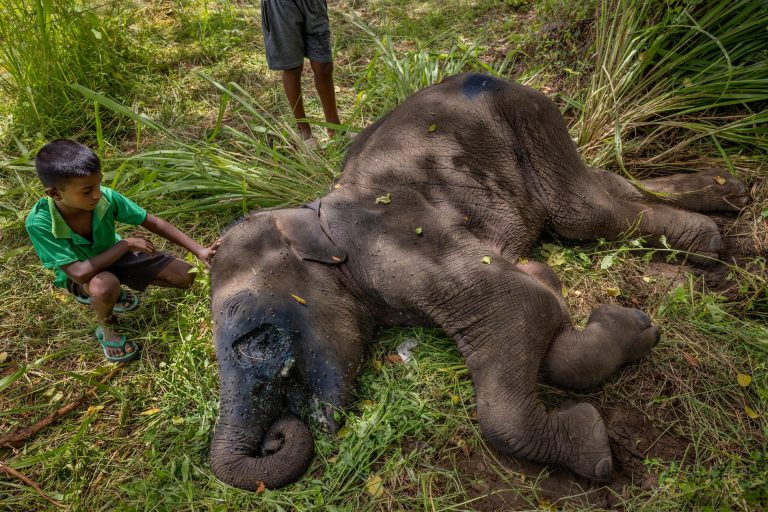Left in a Cardboard Box, This Kitten’s Cry Changed a Stranger’s Life Forever
It was a rainy Tuesday morning in October when David Morgan heard the sound that would change his life.
He was walking home from a night shift at the hospital. Tired, soaked to the bone, and lost in thought, he didn’t notice the cardboard box at first. It was tucked behind a row of garbage bins in an alley off Main Street, barely noticeable beneath a thin layer of wet newspapers.
But then came the sound—soft, weak, and desperate.
A mew.
David stopped. The sound came again, louder this time, almost pleading.
He followed it, pushing aside some trash, and there it was: a tiny, soaked kitten, no bigger than his hand, crouched inside a sagging cardboard box. Its fur was matted, its eyes wide with fear and crusted with infection. The box was lined with nothing but shredded newspaper. No food. No blanket. Just the endless downpour and the cold.
David stared for a moment, unsure of what to do. He wasn’t a “cat person.” In fact, he had never owned a pet in his life. His apartment didn’t allow animals. His job was stressful and erratic, and his days off were few and far between.
But something about the kitten’s eyes—eyes that were barely open, yet still searching—struck a chord.
He gently scooped the kitten up, wrapped it in his jacket, and brought it home.
A Life of Isolation
David had spent most of his adult life in quiet solitude. At 39, he had buried both his parents, drifted apart from old friends, and invested all his energy into his career as an ER nurse. The hospital was his second home, its chaos both a distraction and a refuge. He had grown used to empty dinners, silent rooms, and long walks that led nowhere.
He didn’t mind being alone. Or at least, that’s what he told himself.
But that morning, everything shifted.
He named the kitten Whiskers, despite its sparse little face having only the faintest whiskers at all. He took her to a vet who told him she was severely underweight and dehydrated. She was maybe four weeks old—barely weaned—and wouldn’t have lasted the night outside.
“She’s lucky you found her,” the vet said.
David shook his head, cradling the kitten in a towel. “I think I’m the lucky one.”
Tiny Paws, Big Changes
In the days that followed, David’s apartment transformed.
He bought kitten formula and fed her with a syringe every few hours. He Googled how to stimulate her belly to help her use the litter box, how to treat her crusty eyes, how to keep her warm at night. His alarm clock was no longer set by hospital shifts—but by the tiny mews from the carrier beside his bed.
He didn’t sleep much. He didn’t care.
Something about caring for such a fragile, dependent creature awakened a part of David he thought he had buried—a desire to nurture, to connect, to love.
As Whiskers grew stronger, so did David.
He started talking to her. At first, just simple things—“You hungry?” or “Time for medicine.” But soon he found himself telling her about his day, his patients, his fears, even his loneliness.
She never answered, of course. But she listened in her way—curling in his lap, purring gently, occasionally tapping his cheek with a paw as if to say, “I’m here.”
Healing in Both Directions
There’s something remarkable about the unconditional love animals offer. They don’t care about your past mistakes, your appearance, your failures. They don’t judge. They don’t expect. They simply love.
Whiskers became more than a pet—she became David’s anchor.
He started taking better care of himself. He ate more regularly. He left work on time. He called his sister for the first time in two years and told her about the kitten. She cried.
“I haven’t heard you sound this happy in a long time,” she said.
He hadn’t realized it until then, but she was right.
Whiskers was the first living being he allowed into his heart in a very long time.
A Ripple Effect
David’s coworkers began to notice changes in him. He smiled more. He joked during breaks. He seemed lighter, more open. One of his fellow nurses, Elena, struck up a conversation with him one day while they were both on call.
“Did I hear right? You rescued a kitten?”
“Yeah,” he said with a grin. “Well… she rescued me.”
They laughed. They started eating lunch together. And in time, they started dating.
Whiskers, of course, approved.
A New Chapter
Over the next year, David’s life quietly transformed.
His apartment became filled with cat toys, scratching posts, and photos of Whiskers curled in sunbeams. He started volunteering once a month at the local animal shelter, offering medical support and supplies. He advocated for pet adoption, using his own story to remind people that even the smallest lives can leave the biggest impact.
Whiskers grew into a healthy, curious, and slightly mischievous cat. She loved chasing ribbons, climbing furniture, and curling up on David’s chest at night. But most of all, she loved being close to him.
Because she knew, in her own feline way, that he had saved her.
And he knew, without question, that she had done the same for him.
Legacy of a Cardboard Box
Sometimes, the most profound changes in our lives begin not with grand plans or major events, but with a single moment—a sound, a glance, a choice.
For David, it was the cry of a kitten in a forgotten cardboard box.
Had he kept walking, had he ignored it, had he dismissed that faint mew as background noise, his life would have remained unchanged. He might have continued drifting through days filled with noise and motion but devoid of connection.
But he didn’t ignore it.
He listened.
And in doing so, he found companionship, healing, love—and purpose.
Epilogue
Five years later, Whiskers still sleeps on David’s pillow every night. He and Elena now live together in a small house just outside the city. They’ve adopted two more rescue animals—an elderly dog named Max and another abandoned kitten, Peanut.
Every now and then, David passes by that same alley where he first found Whiskers. The box, of course, is long gone. But the memory lingers.
Not of a broken animal.
But of a second chance.
Moral of the Story
We don’t always know what impact our small actions might have. A kind word, a moment of compassion, a decision to stop and listen—these things ripple.
And sometimes, they start with a cardboard box and a tiny cry in the rain.





